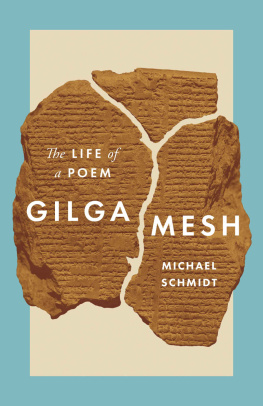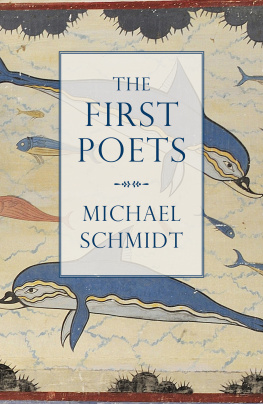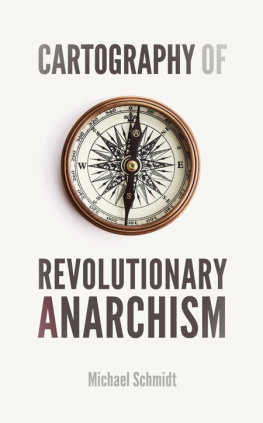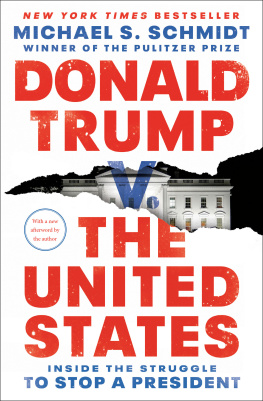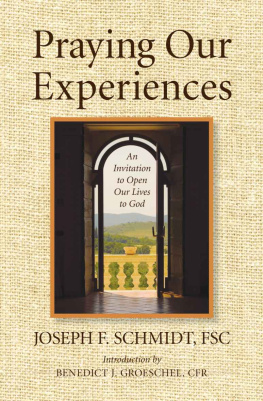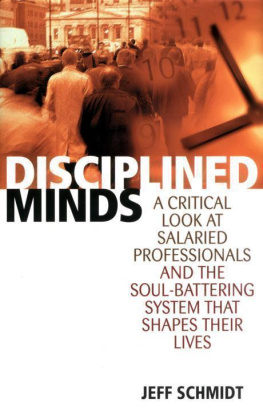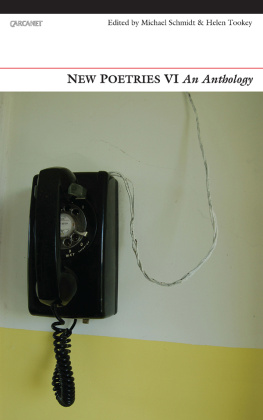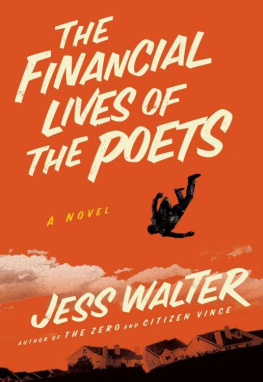Michael Schmidt - Lives of the Poets
Here you can read online Michael Schmidt - Lives of the Poets full text of the book (entire story) in english for free. Download pdf and epub, get meaning, cover and reviews about this ebook. year: 1998, publisher: Knopf Doubleday Publishing Group, genre: Art. Description of the work, (preface) as well as reviews are available. Best literature library LitArk.com created for fans of good reading and offers a wide selection of genres:
Romance novel
Science fiction
Adventure
Detective
Science
History
Home and family
Prose
Art
Politics
Computer
Non-fiction
Religion
Business
Children
Humor
Choose a favorite category and find really read worthwhile books. Enjoy immersion in the world of imagination, feel the emotions of the characters or learn something new for yourself, make an fascinating discovery.

- Book:Lives of the Poets
- Author:
- Publisher:Knopf Doubleday Publishing Group
- Genre:
- Year:1998
- Rating:4 / 5
- Favourites:Add to favourites
- Your mark:
- 80
- 1
- 2
- 3
- 4
- 5
Lives of the Poets: summary, description and annotation
We offer to read an annotation, description, summary or preface (depends on what the author of the book "Lives of the Poets" wrote himself). If you haven't found the necessary information about the book — write in the comments, we will try to find it.
Lives of the Poets — read online for free the complete book (whole text) full work
Below is the text of the book, divided by pages. System saving the place of the last page read, allows you to conveniently read the book "Lives of the Poets" online for free, without having to search again every time where you left off. Put a bookmark, and you can go to the page where you finished reading at any time.
Font size:
Interval:
Bookmark:
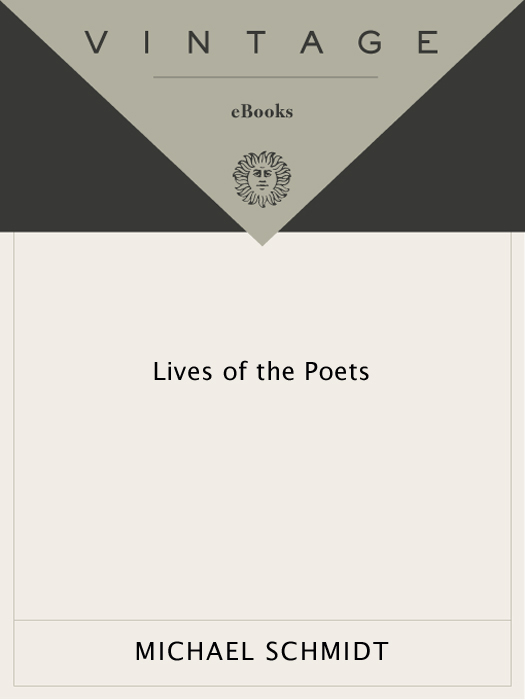
LIVES OF THE POETS
Michael Schmidt was born in 1947 in Mexico, where he was raised. He studied at Harvard and Oxford and is now director of the Writing School at Manchester Metropolitan University in Manchester, England. He is the editor of PN Review, which he established in 1972, and is founder and editorial director of Carcanet Press, which publishes poetry and fiction. His books include collections of poetry, critical books, two novels, and several anthologies. He has translated Nahuatl (Aztec) poetry, and poems and essays by Octavio Paz.
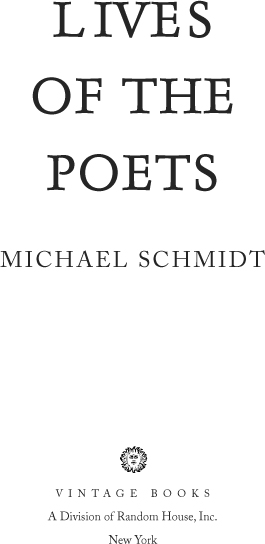
JOSEPH BRODSKY, DEREK WALCOTT, SEAMUS HEANEY, LES MURRAY
W hile the Irish football team played the Soviet Union in 1988, four English poets were confined in a radio studio in Dublinit was the Writers Conferenceto take part in a round-table discussion. English-language poets, that is, for none of them accepts the sobriquet English and one has vehemently rejected it. In the chair was an anglophone Mexican publisher, me.
First of the four was Russian. Joseph Brodsky, a Nobel Prize winner, was attempting that almost possible Conradian, Nabokovian transition from one language to another, writing his new poems directly in English. Jet-lagged and impatient to return to the soccer, he expressed strong opinions on politics, religion, poetry and sport. In his essays he has argued that, as imperial centers corrode and weaken, poetry survives most vigorously in remote provinces, far from their decaying capitals. One thinks of Rome. Now that the British and American claims to the English language have loosened, the art of English poetry continues to thrive. The bourse may still be in the publishing centers of London or New York, but the shares quoted there are in poetic corporations with headquarters in New South Wales, St. Lucia, County Wicklow
There is a triumphalism in this line of argument: emancipation. The postcolonial is as much a fashion in literature as the Colonial is in home decoration. Brodsky might have conceded (he did not) that ethnicity, gender and sexual preference can themselves be provinces or peripheries in which, even at the heart of the old geographical centers of empire, poetry can grow. It is an art that thrives when language itself is interrogated, from the moment John Gower challenged himself, Why not write in English? to Wordsworths asking, Why not write a language closer to speech? to Adrienne Richs asking, Why write in the forms that a tradition hostile to me and my kind prescribes? History and politics can play a part: they propose questions. In poetry the answers come not as argument but as form.
Over a century and a half ago America began to establish its independence, kicking (as Edgar Allan Poe put it) the British grandmama downstairs. Early in this century Scotland began to reaffirm its space, and Ireland too, a space that is firstly political and then cultural. We can speak of sharing a common language only when we possess it, when it is our language rather than theirs. For the Jamaican poet and historian Edward Kamau Braithwaite the English of the educational system in which he was raised, the English of the poetic tradition, is theirs. For many black writers in the United States in the 1950s and 1960s, it was theirs. For working-class English writers such as Tony Harrison it was theirs. When writers interrogate language, they set themselves one of two tasks: to reinvent it, or to take it by storm and (as the novelist Gabriel Garca Mrquez puts it) expropriate it, give it to the people, often for the first time. I hate relegation of any sort, says Les Murray. I hate people being left out. Of course, that I suppose has been the main drama of my lifecoming from the left-out people into the accepted people and being worried about the relegated who are still relegated. I dont want there to be any pockets of relegation left.
A time has almost comethe round-table discussion was early evidence of itto speak unapologetically of a common language, at least for poetry. Instead of affirming separation and difference, we can begin to affirm continuitynot only geographical but historical, analogies and real connections between Eavan Boland and Alfred, Lord Tennyson, Allen Ginsberg and William Blake, John Ashbery and Thomas Lovell Beddoes, Thom Gunn and Ben Jonson, Elizabeth Bishop and Alexander Pope. The story that includes all poets can be told from the beginning.
The second poet in the studio that afternoon was Derek Walcott, born in Castries, St. Lucia, in 1930, of a West Indian mother and an English father.
Im just a red nigger who love the sea,
I had a sound colonial education,
I have Dutch, nigger, and English in me,
and either Im nobody, or Im a nation.
His was a francophone and Roman Catholic island; he is from an English-speaking Methodist culture. Solidarity is not the issue for him that it has become for Brathwaite. He distinguishes between English, his mother tongue, and the form he used at home, his mothers tongue. He might have courted approval had he chosen to affirm himself in terms of race, but he chose instead to identify himself with all the resources of his language. After all, English wasnt his second language. It was my language. I never felt it belonged to anybody else, I never felt that I was really borrowing it. In a poem about the shrinking back of empire, he writes, Its good that everythings gone except their language, which is everything. They have left it and now it is his. Shakespeare, Herrick, Herbert and Larkin belong to him just as they would to an English person. Theres no point in denying the violence and dislocations of colonialism, but if, given what history has already done, a writer responds by rejecting the untainted together with the tainted resources
The third poet at the table was Seamus Heaney. Born in the north of Ireland, he has complained of being force-fed with the literary language, the civilized utterance from the classic canon of English poetry. At school, poetry class did not delight us by reflecting our experience; it did not reecho our own speech in formal and surprising arrangements. Poetry lessons, in fact, were rather like catechism lessons.
He has tempered his views since he wrote of the exclusive civilities of English. At the round table he declared that the colonial and postcolonial argument is a theme; its a way of discoursing about other things, to talk about the language. Its a way of talking about being Protestants and Catholics without using bigoted, sectarian terms, its a way of talking about heritage. But the fact of the matter is that linguistically one is very adept. He remembers as a child with the South Derry intonation at the back of my throat being able to hear, as he read, even though he could not speak it, the alien and beguiling intonations of P. G. Wodehouse. Language can be a medium of servitude; but it can alsoproperly apprehendedbecome a measure of freedom. A great writer within any culture changes everything. Because the thing is different afterwards and people comprehend themselves differently. If you take Ireland before James Joyce and Ireland fifty years afterwards, the reality of being part of the collective life is enhanced and changed.
The fourth poet, the Australian Les Murray, is a witness to the abundance of the English language and to the freedoms it offers. Born in 1938 in Nabiac, rural New South Wales, he was an only child and grew up on his fathers dairy farm in Bunyah. His mother died when he was a boy. In solitude he developed a close affinity with the natural world. Australia is a predominantly urban society; Murray is thoroughly rural. In 1986 he returned to Bunyah to farm, to live with the poetry of gossip, what he calls bush balladry, and to work for wholespeak. He takes his bearings, emblematically, from Homer and Hesiod: the arts of war and of peace (Hesiods
Font size:
Interval:
Bookmark:
Similar books «Lives of the Poets»
Look at similar books to Lives of the Poets. We have selected literature similar in name and meaning in the hope of providing readers with more options to find new, interesting, not yet read works.
Discussion, reviews of the book Lives of the Poets and just readers' own opinions. Leave your comments, write what you think about the work, its meaning or the main characters. Specify what exactly you liked and what you didn't like, and why you think so.



